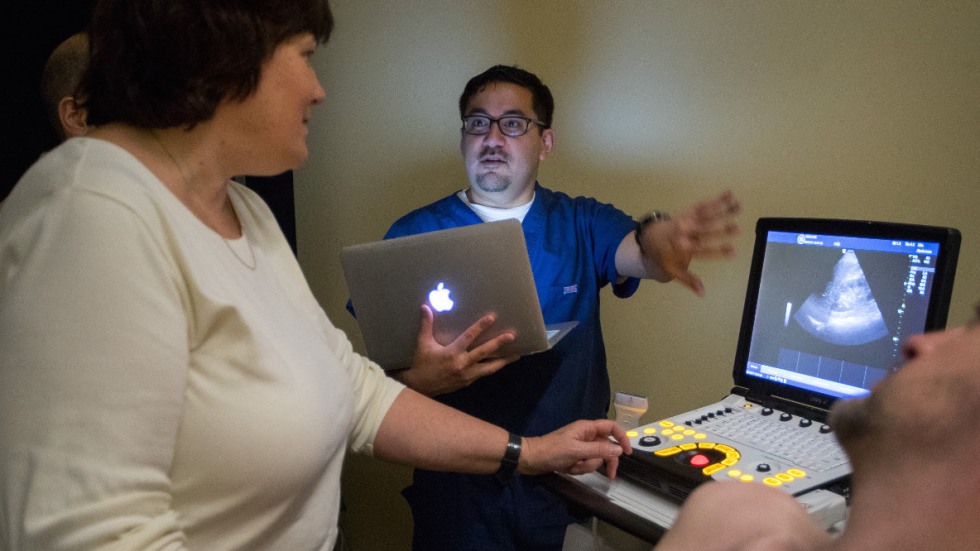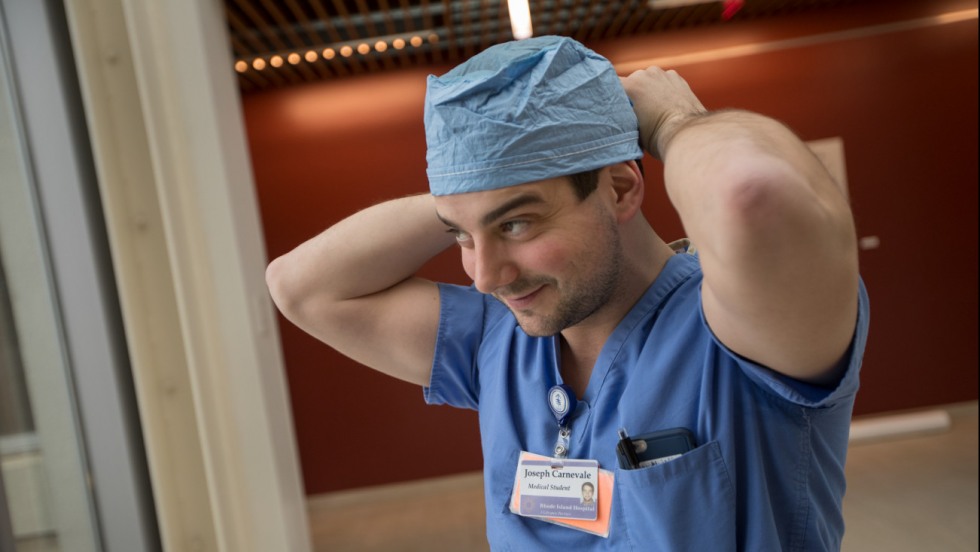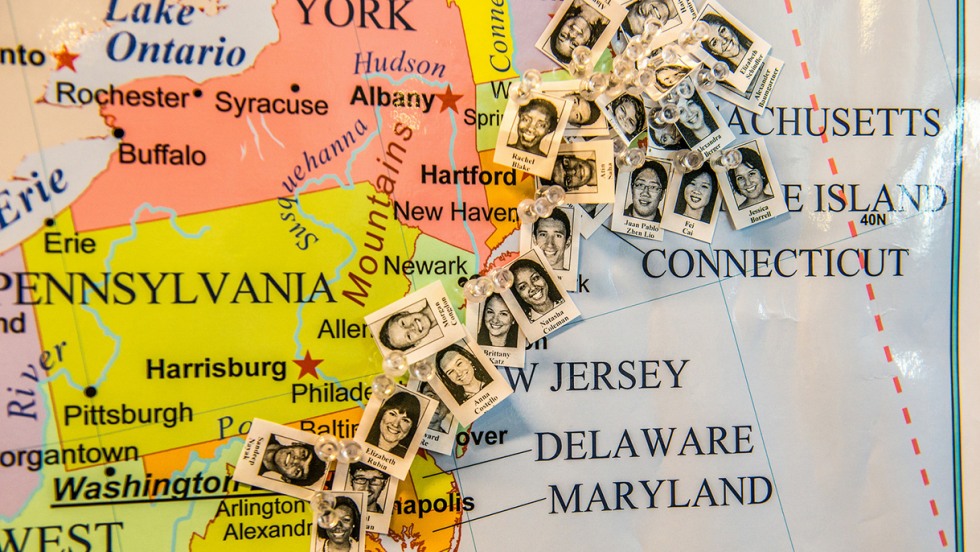PROVIDENCE, R.I. [Brown University] — PROVIDENCE, R.I. [Brown University] — Joseph Carnevale, a fourth-year Alpert Medical School student who grew up in Providence, is awaiting Match Day on March 17 — when he’ll learn where he will start his medical career as a resident — with a “nervous excitement.” As with scores of other graduating peers at Brown, residency will mark his debut as a physician and will determine where he lives for at least the next several years.
The way medical students get their first job, by being told where to go rather than choosing it, is something he puts into sports terms to explain to his non-medical friends.
“It’s not really a job offer,” Carnevale said. “I can’t really deny it. It’s more like a draft — you get picked for a team and you’ve got to play your hardest.”
On Match Day, that third Friday in March when graduating medical students across the country learn where they will become residents, all is revealed at exactly noon Eastern Daylight Time. Medical schools often festoon Match Day events with party trimmings like cupcakes, balloons and music, but it’s no magic moment. Instead, it is the culmination of an increasingly grueling nine months of composing a mammoth application, traveling for interviews and engaging in intensive introspection.
Fully aware of the stakes for their careers and their lives, students feel great pressure to match, and many do everything they can to ensure it’s at one of their preferred hospitals. Every student’s experience is different. Carnevale, who is pursuing an especially competitive residency in neurological surgery, said he applied to 68 programs and went on 26 of the 47 interviews he landed. It’s not only time consuming, but also expensive.
“I took a very roundabout trip throughout the country,” he said. “I went to Seattle, Phoenix, Houston, Chicago, Rochester, Raleigh, Washington, D.C., New York and Boston and a fair number of cities in between.”
Only one program of the 26 paid for a hotel room. Where Carnevale could, he stayed with friends and senior residents in the programs he visited. To finance all his travels, he borrowed money, adding to his loans.
The amount of work, money and worry that students invest in making a match is not only substantial, but also growing. The average fourth-year medical student applied to more than 45 programs in 2015, up from an average of 30 in 2005, according to research by Brown medical professors Eli Adashi and Philip Gruppuso published in the journal Academic Medicine last year. In their report, the former deans expressed concern that the process had become a “fever,” especially given statistics showing that graduates M.D.-granting U.S. medical schools have a more than 90 percent chance of matching.
“At the end of the day, if you are a U.S. medical school graduate, you are virtually assured of getting a job,” said Gruppuso, who along with Adashi worries that the fever is not only driving up stress and expenses for students but also overtaking the academics of the fourth year.
These busy job seekers are still students, after all. Amid all the jet-setting to interviews, they still must take classes and engage in “rotations,” or clinical training experiences such as working in an emergency department, attending surgeries or becoming embedded in a pediatrician’s office.
But students clearly aren’t taking any chances. Brian Kwan, who hopes to match on March 17 to an emergency medicine residency, said he applied to 41 programs and exceeded the dozen interviews that statistics from the National Resident Matching Program how are needed to essentially guarantee a match for his specialty. He said he “AirBnB’d and couch surfed” whenever possible.
Kwan also said the residency matching fever that Adashi and Gruppuso described reminds him of what he saw in nine years of teaching high school — one of a few careers he had before studying medicine.
“I was watching my students go through the college application process,” he said. “Everything just continually seems be getting ramped up. It’s harder to get in and therefore more prep work has to be done.”
Months of work and travel
The application process begins in June, a month into the fourth year. Students start to gather and develop all the materials (essays, letters of support, exam scores, research accomplishments, transcripts and more) for their application, which they then send to scores of programs, if they desire, by Sept. 15. The fees for doing so, which range in the hundreds of dollars, rise with the number of submissions over 20.
Not long after the applications go out, the interview requests come in from October into February. There is no real way to predict them, and they might take more than a day or two including travel, so students and faculty members, including the doctors who supervise rotations, must agree to be flexible.
“You have to be very straightforward with the rotation that you are taking and say at the beginning, I’m interested in doing dermatology, or orthopedics or emergency medicine but I’m going to have to miss a couple of days for interviews,” Carnevale said. “In a lot of instances, people are understanding because they were in the same place not too long ago, but it’s a very difficult thing to juggle.”
Students can also schedule independent study time and take online courses during this period so that they can continue to learn even if they are on the road. Carnevale said he studied medical Spanish and took an EKG reading class that way.
Despite the matching stress, Kwan said he’s still enjoyed his fourth-year curriculum. He said he’s learned a great deal, for example, in rotations through intensive care, coronary care and emergency medicine and emergency medicine ultrasound.
Sometimes the pedagogy of the fourth-year and the match process coincide in the form of “away rotations,” in which the student’s clinical experience occurs at another medical school’s affiliated hospital. When a student has a residency application pending there, it’s essentially an audition. Kwan, who lived in Los Angeles for 13 years, performed his away rotation at Los Angeles County University of Southern California Medical Center.
When the interviews and away rotations are done, the students rank their favorite hospitals and the hospitals rank their favorite students. In February, they all submit those lists to the National Resident Matching Program, which feeds them into optimization algorithms that spit out everyone’s fate. The Monday before Match Day, on March 13, students find out whether they’ve matched — on Match Day itself, they find out where.
Heading to Match Day
Carnevale said he is looking forward to launching his career, which he hopes will include not only clinical practice but also teaching, research (he’s been studying traumatic brain injury at Rhode Island Hospital while a student) and global health. There are organizations, he said, that bring neurosurgery to places in the world that don’t have it, and he’d love to get involved with those during his career.
Anticipation is all that is left for the match process now.
“Most people I know are pretty anxious about it,” Kwan said.
Carnevale agreed: “There is a legitimate concern and fear of not matching.”
But there are also good reasons to be confident, they said. Prior classes of Brown students have paved the way with a good track record in residencies in the same places that many members of his class have now applied, he said.
“Brown has a fantastic reputation throughout the country,” Carnevale noted. “To be in Seattle and hear people say, ‘Oh you go to Brown!’ and they acknowledge it, appreciate it and respect it, I think it’s an amazing thing.”
Kwan, meanwhile, points to other sources of confidence and comfort.
First of all, he said, he takes assurance from the advising he received both from the school’s student advising staff and from the faculty advisers in his specialty.
Also, this is not his first career. He has worked as a pharmaceutical chemist, a teacher and an emergency medical technician. He therefore knows that life doesn’t have to be defined by a single moment.
And Kwan said he’s come a long way since his first year when he was alone in Rhode Island and began to worry that maybe he had made a mistake. Now he’s been interviewed for residency at places he said he never thought he would be invited to.
“The goal at this point is to be an emergency medicine resident,” he said. “At any of those programs I put on my match list, I think I will come out being very well trained.
“If I end up matching somewhere, the goal is accomplished.”
Editor’s Note: On Monday, March 13, at 11 a.m., Carnevale and Kwan each received good news. They matched somewhere. On Match Day, amid festivities at the Alpert Medical School building, they’ll find out where.


